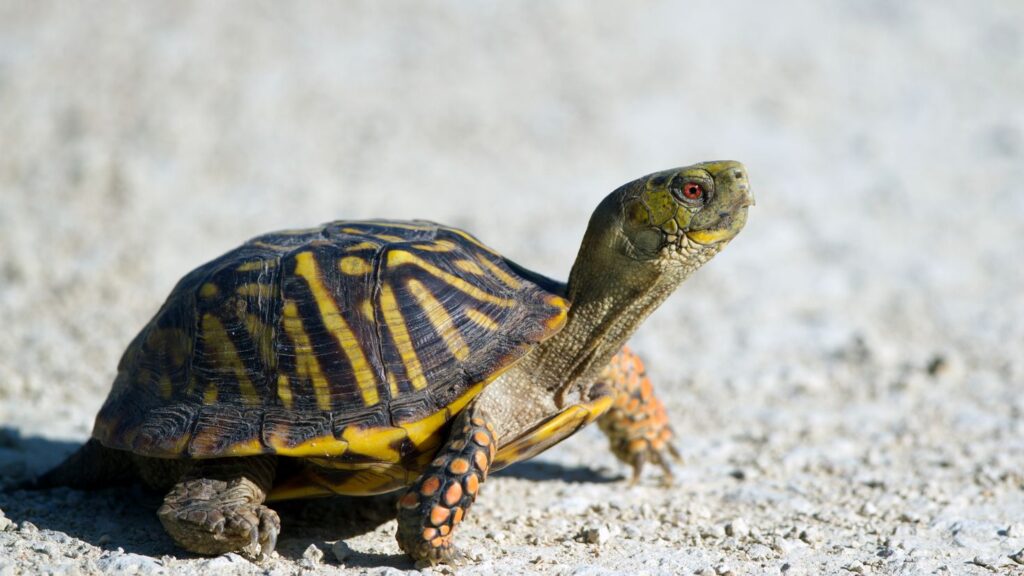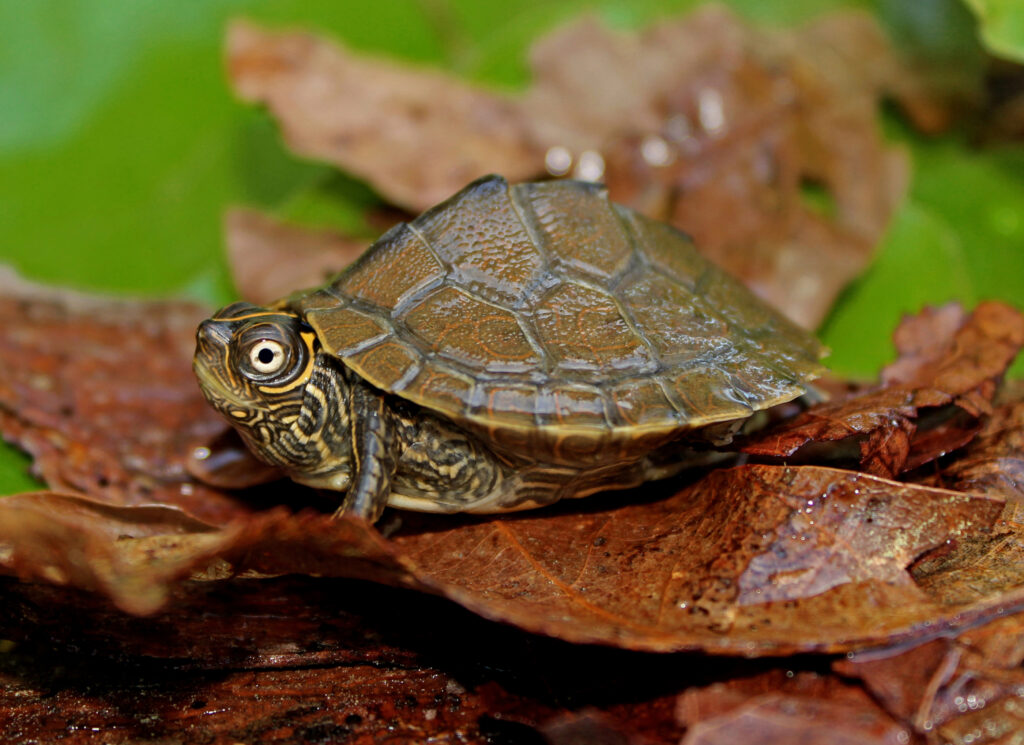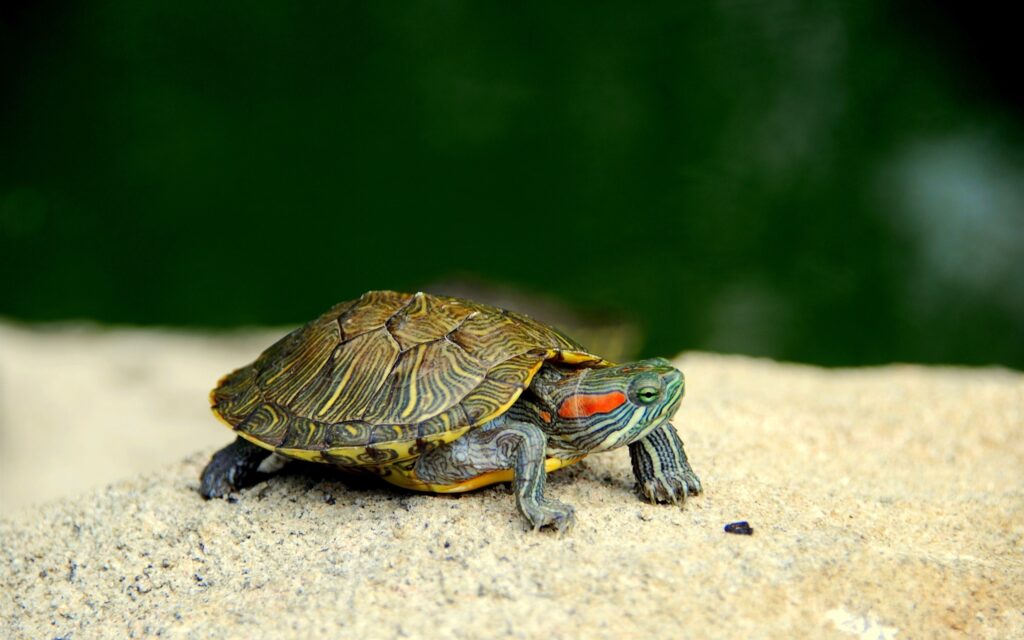Table of Contents
ToggleIntroduction
Turtles, with their slow and steady demeanor, have captivated the hearts of many reptile enthusiasts. As responsible pet owners, providing our shelled companions with a well-balanced and nutritious diet is crucial. While commercial turtle pellets and fresh vegetables are staples in a turtle’s diet, can turtles eat dog food? Some may wonder if unconventional options, such as dog food, can suit these unique creatures.

Understanding Turtle Nutrition
Before delving into the compatibility of dog food with turtles, it’s essential to understand the specific nutritional requirements of these reptiles. Turtles are omnivores, meaning they consume a combination of plant and animal matter. Their diet typically consists of leafy greens, vegetables, fruits, and small amounts of protein from insects, worms, or aquatic organisms.
A well-balanced turtle diet should include the following:
Leafy Greens: Dark, leafy greens like kale, collard, and mustard provide essential vitamins and minerals like calcium.
Vegetables: Carrots, squash, and bell peppers offer a variety of nutrients and add color to their diet.
Fruits: Limited amounts of fruits like strawberries and melons provide natural sugars and additional vitamins.
Protein: Insects, worms, fish, and aquatic invertebrates are excellent protein sources for turtles.
Commercial Turtle Pellets: Specially formulated turtle pellets are designed to meet the nutritional needs of turtles and often include vitamins and minerals essential for their health.
Can Turtles Eat Dog Food?
Dog food is formulated to meet the nutritional needs of dogs, which are quite different from those of turtles. Dog food typically contains a combination of meat, grains, and other ingredients tailored to support a canine’s health. While turtles are omnivores like dogs, their dietary requirements are not identical.
Protein Content: Dog food often contains higher protein levels than turtles require. Excessive protein intake can lead to kidney problems in turtles, as their bodies are not adapted to metabolize large amounts of protein efficiently.
Calcium and Phosphorus Ratio: Turtles need a balanced calcium-to-phosphorus ratio for proper shell development. Dog food may not have the appropriate calcium-phosphorus balance required for a turtle’s health.
Vitamin and Mineral Composition: Turtles require specific vitamins and minerals for overall well-being. Dog food may lack essential nutrients, such as vitamin A, crucial for a turtle’s health.
Texture and Size: Turtles have specific feeding habits and may struggle with the size and texture of dog food. Turtles often prefer bite-sized pieces or pellets that are easy to consume.
Additives and Preservatives: Dog food may contain additives, preservatives, and artificial flavors that could harm turtles. Turtles are sensitive to certain chemicals that may be present in dog food.
It’s crucial to note that relying solely on dog food for a turtle’s diet can lead to nutritional deficiencies and health problems. However, in some cases, small amounts of high-quality dog food may be used as an occasional treat for turtles, but it should never replace their primary diet.
Choosing The Right Dog Food For Turtles

If you decide to incorporate dog food into your turtle’s diet occasionally, choosing a high-quality, balanced option is essential.
Consider the following factors when selecting dog food for turtles:
Protein Levels: Opt for dog food with moderate protein levels, preferably around 20-25%. Avoid high-protein dog foods designed for active or growing dogs.
Calcium-Phosphorus Balance: Look for dog food with a balanced calcium-phosphorus ratio, or consider supplementing your turtle’s diet with calcium if it lacks it.
No Artificial Additives: Choose dog food with minimal additives, preservatives, and artificial flavors. Turtles can be sensitive to certain chemicals present in processed foods.
Limited Ingredients: Select dog food with a simple and little ingredient list. Avoid products with excessive fillers or ingredients that may be harmful to turtles.
Feeding Dog Food To Turtles: Dos And Don’ts
Dos:
Moderation is Key: If you feed your turtle dog food, do so in moderation. It should never replace the staple diet of fresh vegetables, fruits, and protein sources.
Variety in the Diet: Turtles benefit from a diverse diet. Use dog food as an occasional treat rather than a primary source of nutrition.
Monitor for Allergic Reactions: Watch for any signs of allergic reactions or digestive issues when introducing dog food to your turtle’s diet. If you notice any adverse effects, discontinue the use of dog food.
Consult with a Veterinarian: Before making any significant changes to your turtle’s diet, consult with a veterinarian specializing in reptile care. They can provide personalized advice based on your turtle’s species, age, and health condition.
Don’ts:
Avoid High-Fat Dog Foods: High-fat dog foods are unsuitable for turtles, as they can lead to obesity and other health problems. Stick to moderate-fat options.
No Seasonings or Flavorings: Do not feed turtles dog food with added seasonings, flavorings, or excessive salt. Turtles have sensitive digestive systems and may not tolerate such additives well.
Not a Substitute for Proper Nutrition: Dog food should never replace a well-rounded and species-appropriate diet for turtles. It should only be an occasional supplement, not a primary food source.
Watch for Behavioral Changes: If you notice changes in your turtle’s behavior, such as lethargy, loss of appetite, or abnormal stool, stop feeding dog food immediately and seek veterinary advice.
Conclusion
While turtles can technically eat dog food, it should not be a significant part of their diet. Turtles have specific nutritional needs best met through a well-balanced combination of fresh vegetables, fruits, and protein sources. Dog food may lack essential nutrients and have an imbalanced composition, making it an unsuitable primary food source for turtles.
If you occasionally offer dog food to your turtle, do so in moderation and select a high-quality option with a balanced nutritional profile. Always prioritize a diverse and species-appropriate diet for your shelled companion, and consult with a reptile veterinarian for personalized advice on your turtle’s nutrition.
Remember, the key to a healthy and happy turtle is providing a varied, nutritious diet that mimics their natural eating habits and supports their unique nutritional requirements.







